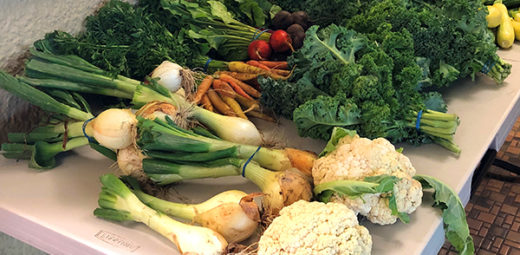
Oct 16The Fight Against Hunger and How You Are Making a Difference
Your stomach rumbles and you know soon you will be desperate for a meal. But where will you get food to eat? Imagine how scary it would feel not knowing where your next meal is coming from or watching your children go hungry because money is tight. This is what real hunger looks like and it’s a serious problem for millions of Americans across the country.

For many low-income families, eating three nutritious meals a day is simply not possible. It can be a daily challenge brought on by a multitude of barriers. Have you heard the term food insecurity? It is often associated with these challenges and refers to someone struggling to put food on the table for themselves or their family.

There are many factors that contribute to this complex problem; transportation, unemployment, income, and access to affordable food all play a role. People are going hungry every day, and it’s impacting the current and long-term health of families in need.
Persistent hunger and unhealthy meals result in fatigue, irritability, and trouble concentrating. It can contribute to chronic health conditions, too. Depression, hypertension, anxiety, asthma, birth defects, cognitive and behavioral problems, and diabetes are some common issues associated with malnutrition. All these factors contribute to increased health expenses, not only for those directly impacted, but the rest of us too.
National Problem — Local Solutions
Although the fight against hunger is a national problem, solutions are being met at the local level. Communities throughout the United States have started to look inward to develop strategies that reduce the number of people affected by food insecurity because combatting a gigantic issue like hunger requires a lot of helping hands.

Mercy Housing has increased efforts to understand this epidemic and how it impacts the residents that call Mercy Housing home.
To fight hunger in the Mountain Plains region, Mercy Housing leverages partnerships with other nonprofit organizations, volunteers, and local food banks to help supplement residents’ weekly and monthly grocery needs. Resident Services Coordinators work with residents to provide specific programming to alleviate barriers and offer support in accessing government programs, such as Supplemental Nutrition Assistance Program (SNAP), formerly known as Food Stamps.
These resources offer assistance to Mercy Housing residents in need and reduce the overall effects of food insecurity.
Let Your Garden Grow!
Community gardens are a great way to engage residents and be active participants in the fight against hunger. Through South Dakota State University Extension’s (SDSU Extension) Healthy Food, Healthy Families, Healthy Communities project (funded by SNAP-Education), SDSU-Extension has been able to help connect residents with fresh fruits and vegetables.

Prairey, SDSU Extension’s Family & Community Health Field Specialist, has encouraged residents to participate in the preparation, planting, and maintenance of their community garden, named Shire Garden.
“I believe Shire Garden has improved the quality of life for Northern Heights’ residents and I am proud of all the leaders and residents who have taken part in this effort – SDSU Extension SNAP-Ed is honored to be a part of it,” said Prairey.
A 2019 grant from Farm Credit Services of America, along with assistance from Box Elder Job Corps, and local Master Gardener Janet Smith, allowed for the recent addition of raised garden beds to be installed. This will provide increased accessibility for residents, making it easier for them to sustain Shire Garden and reduce hunger for years to come.
“My hope is that SDSU Extension and Mercy Housing are able to work together on future wellness projects that will benefit the health of their community,” says Prairey, SDSU Extension’s Family & Community Health Field Specialist.
Lending a Helping Hand

Volunteers are instrumental in reducing food insecurity. Vic, computer programmer and real estate entrepreneur, volunteers at Aromor Apartments in Denver. Once a month, Vic picks up surplus produce provided by the Chatfield Botanic Gardens Farm Stand. The Farm Stand is a partnership between Denver Human Services, the City and County of Denver, and United Health to increase access to healthy, fresh vegetables to vulnerable populations.
Residents have appreciated the variety of vegetables from the stand and the convenience of getting them delivered to the property. And Vic enjoys his time spent helping any way he can, and especially enjoys chatting with residents.
Vic explains, “As a computer programmer that works mainly from home, I really appreciate the human interaction. I’m realizing the social responsibility of housing to our community. I hope to become successful with my own ventures and I want to include my own contribution, hopefully with Mercy Housing.”
The Work Continues
While efforts to reduce hunger across the Mercy Housing community have made a positive impact on the lives of many residents, the work to completely eradicate food insecurity continues.
But it can’t be done alone. It takes a concerted effort from our community, volunteers, and organizations with a passion to help provide the most basic and fundamental resources to those in need.
Helping keep our onsite food pantries full is one way to ensure residents have access to food, all year round. Visit mercyhousing.org/FullPantry to help.
No related posts.
Stay Up To Date
Get news on Mercy Housing and inspiring stories of change delivered to your inbox.


